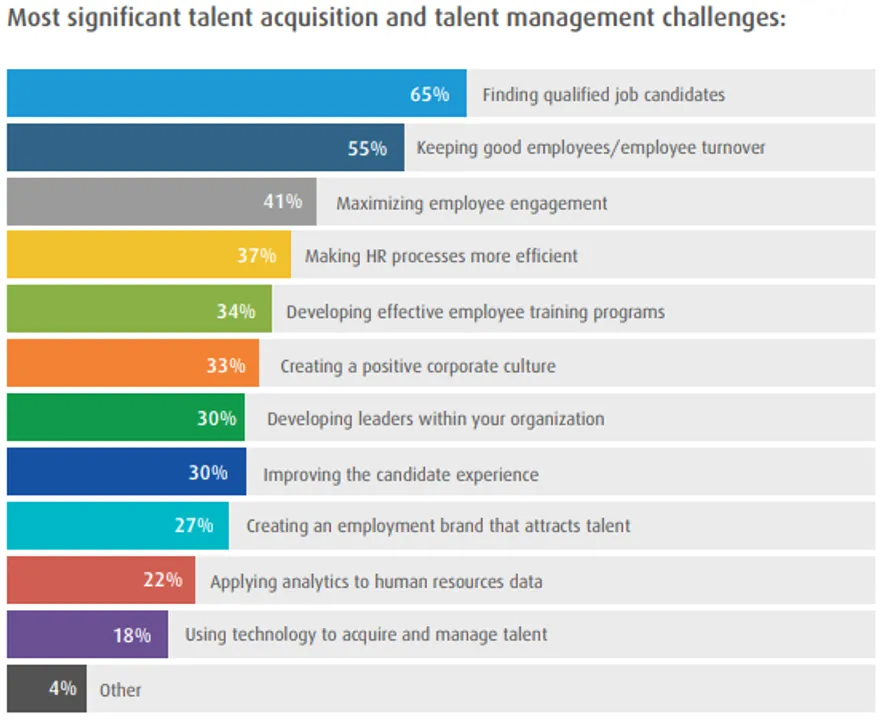Healthcare Survey Highlights Challenges for Recruiters
 Healthcare remains one of the fastest growing occupations in the United States. A recent survey from HireRight, their Healthcare Spotlight Report 2018, confirms institutions are expanding staffing levels, with 76% of industry respondents pointing to plans to grow their workforce in the coming year. Where are they finding talent? The survey shows 85% of healthcare facilities turn to online job boards to recruit talent, while 70% leverage referrals to hire.
Healthcare remains one of the fastest growing occupations in the United States. A recent survey from HireRight, their Healthcare Spotlight Report 2018, confirms institutions are expanding staffing levels, with 76% of industry respondents pointing to plans to grow their workforce in the coming year. Where are they finding talent? The survey shows 85% of healthcare facilities turn to online job boards to recruit talent, while 70% leverage referrals to hire.
Mary Lundregan, Healthcare Solutions Consultant with HireRight, provides more insight into the data.
What are the key takeaways healthcare facilities can use from the report?
The report is a great tool for healthcare organizations to use as a conversation starter about some of the more significant HR challenges. It also allows these teams to see they are not alone in facing challenges in hiring and screening in healthcare. Specific areas of useful insight for healthcare facilities to walk away with may very well be around the need to ensure appropriate screening for global candidates who have lived, worked, or been educated in other countries. It is an important risk to understand and assess within a robust screening program.
As the challenging talent market has shifted recruitment in favor of applicants, where are the biggest changes you see in recruiting?
In such a tight market, every organization is competing for the best talent. The hiring process (from application, to background screening, to onboarding) needs to be candidate friendly and go as smoothly and quickly as possible. This is the first opportunity to show the candidate just how welcoming and efficient the organization can be. Every part of the process, including aspects that may involve a vendor, like background screening, can reflect the values, the brand, and the vision an organization wants to promote. If any part of this process breaks down, it is an opportunity for the candidate to look to another employer. With this in mind, processes and platforms that make the hiring process easy, mobile first, and respectful of the candidate’s time are where we see focus in the recruiting and hiring process. All of these efforts put the candidate experience at the forefront of the process and set the tone for their employment.
Another area of focus we see in recruiting/hiring is understanding the desires and needs of different generations. What has been a draw for candidates in the past is proving to be different now. Flexible work schedules, for example, are an in-demand feature for Millennials. Understanding what motivates and drives your candidates will help you reach them and ensure a successful recruiting and hiring effort.
As referrals are increasing to source candidates, are facilities offering incentives for employees to suggest candidates?
Yes, we are seeing employee referrals as a tool for candidate recruitment and, in fact, we are seeing an increase in usage of this tool. It makes sense. If you have good employees, who are good at what they do, the hope is they know others like themselves. It really does double the win. By providing those employees with an incentive to refer friends and colleagues with similar skills, traits or work ethics, you reward the employee and provide an incentive for them to stay, while also getting new, good talent in the pipeline.
In the future, respondents cited finding qualified candidates as a significant goal - any suggestions on being more successful in this area?
We are seeing a shift in how organizations are working to recruit talent. Perhaps the changes can be attributed to generational differences. Flexible schedules and more focus on signing bonuses are growing in popularity as recruiting tools for the best talent.
Which professions in the healthcare industry are growing the fastest?
Physician Assistants, Nurse Practitioners, Pharmacy positions are seeing significant growth now and are projected to keep growing in demand.
Are any fields not growing, or even shrinking?
Changes in healthcare delivery models (for example, moves away from inpatient care) may impact some job categories in healthcare in future years.
Which medical specialties are most in demand?
Trends seem to indicate continued demand for physicians of all types, including the popular family practice physicians and those who specialize in mental health (psychologists, psychiatrists).
Aside from physicians, are U.S. hospitals also recruiting/hiring other categories (therapists, nursing, etc) of foreign born/foreign trained patient care providers?
Yes. As demand grows, organizations will continue to look for talent where it is available. In fact, we see some of the highest rates of foreign-born caregivers in the area of home health.
When hiring FMG physicians, do federal authorities investigate the foreign background of those physicians?
Yes. FMG physicians are subject to thorough and in depth screening and review as part of their visa process. Despite healthcare having the highest percentage of foreign-born, foreign-educated and foreign-trained workers of any industry in the U.S., only 12% of survey respondents said they screen international backgrounds of U.S.-based employees, down 5% from 2017.
What is the legal liability of not investigating foreign backgrounds?
The legal liability of not screening is the same across the board, regardless of background of the candidate. Introducing someone into a workplace without vetting him or her leaves an organization open to significant risk. A robust and global screening program helps mitigate that risk.
What does a background screening look like for a foreign born/foreign trained physician? Does it simply verify dates of training and employment? Criminal or civil issues as well?
The background screening of a foreign born/foreign trained physician should look very much like the screening of a US born or trained physician. Screenings that include criminal history (where available), education and work history, license verification, and other elements should all be part of the screening process. A global screening provider will be able to support screenings wherever they are available and allowed by law.
Related Posts
